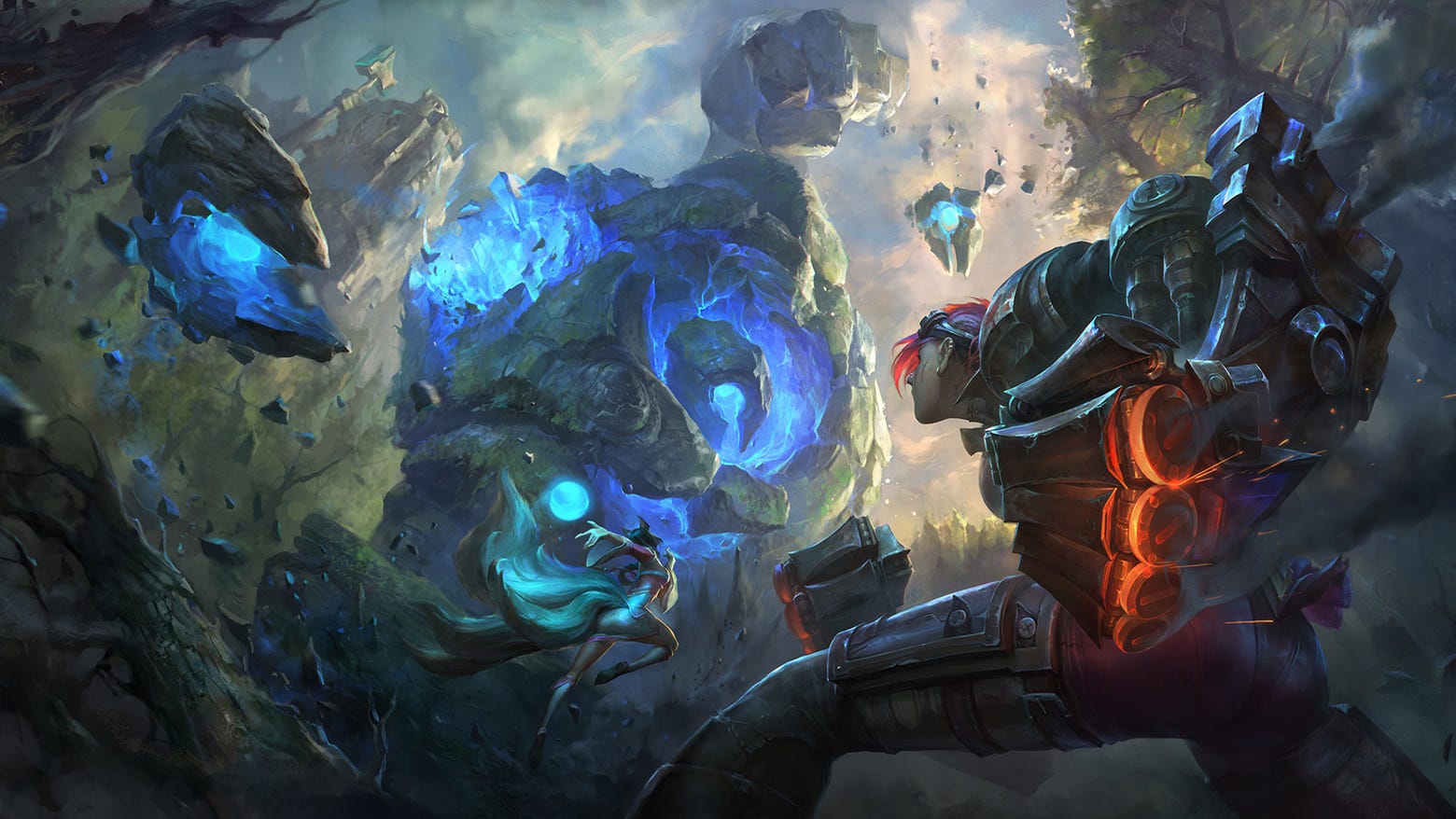Here's what we’ve talked about over the last several months:
- Blog 1, late June: State of the Champion Balance Framework, with details on what we’ve adjusted since its inception last year
- Blog 2, early July: Updated approach to balancing new champs and VGUs
- Blog 3, mid August: Balancing for Pro play and major tournaments like Worlds
- Blog 4, early September: Balancing
runes anditems, a la preseason 2021. (We were going to cover runes here, but uh, this blog is already a bit long. Could be something we dive into in the future.)
Items Aren’t Champions
Items present a different set of balance challenges than champions. Everyone picks one champion per game but many items over the course of the game. Those decisions depend on what's happening moment-to-moment, and our balance approach has to reflect that nuance.
Take Mejai's Soulstealer. It often sits at 80% winrate, which seems overpowered. Nerfing based on that stat would be the wrong call, though: You only buy Mejai's after you've built an early lead, meaning you have a higher chance of winning anyway. Nerfing Mejai's to 50% would end up decreasing your chance of winning those games.
In a similar vein, where in a build an item is purchased is also important. Sixth-slot items like Guardian Angel generally appear to be stronger because champions with large gold advantages are a lot more likely to be able to build them.
So while it's easy to agree that a champion winning 58% of their games is way over the line, item data is more nuanced. That's why we want to create a framework to more consistently evaluate item balance as its own space with its own needs. Like the Champion Balance Framework, the Item Balance Framework will offer a valuable and objective view on what's needed to keep the item system balanced patch-to-patch. And like champions, there'll still likely be deeper item issues that require bigger solves—issues that fall outside the framework's patch-to-patch scope.
Per the notes of nuance above, we'll also be taking a careful approach when acting on item balance flags. Unlike buffing or nerfing a champion, changing items can have a much larger ripple effect on the game, and we want to be thoughtful in the changes we make here. While the framework should improve our responsiveness to item balance issues, we won't act rashly on out-of-balance indicators when doing so would risk a cascade of additional problems.
While there’s a lot of nuance to item balance, this preseason's item overhaul puts us in a great position to kick off a new framework, which will hopefully assist us in maintaining the system for years to come.
Welcoming the New Preseason
As you may have read in our Preseason 2021 Plans or seen in the latest Riot Pls, this preseason will feature a top-to-bottom update of League’s item system. Our main aim is to hit the following five goals:
- Item purchasing is quick and intuitive
- Every champion can make strategic decisions through item choices in every game
- Item builds enable exciting ways to master your champion
- Items feel epically powerful and enhance your champion’s fantasy
- Iconic items are retained and you don’t have to relearn everything from scratch
Immediately delivering on these goals is a challenge we’re excited to meet, and for the first time since launch, we'll have updated the fundamental design principles underpinning the entire item system. This is a giant leap forward for our ability to keep these items in a balanced state long after launch.
So what does this balanced state look like?
At a high level, we want builds to be exciting without overwhelming a champion’s kit. Items should feel epically powerful and enhance playstyles, but not go so far as to become the only realistic option for champions or classes (becoming "hardbound" to them). The overall power level of item builds today feels like it's in the right spot, but the system struggles with numerous cases of hardbinding (Yuumi and Athene’s, for example).
This is a delicate tightrope to walk for all the reasons we've discussed and more, hence the idea to create an Item Balance Framework.
We’re Sharing Our New Approach Early
When we say we're creating a new framework, we mean we're literally still in the process of creating it. It's very work-in-progress. Unlike the Champion Balance Framework, we’ll be launching the Item Balance Framework in preseason before running it through trials on live servers. This is in large part because a massive chunk of our data won't exist until preseason's item system overhaul.
Because of how fresh the item framework will be, and because we expect there'll be a learning curve for items (like there is for new champions) that'll obfuscate actual balance state, we're planning to assess our balance parameters every month after release until things settle back down. There's a very high likelihood the numbers you see below will change between now and the first time you see your favorite item nerfed.
Great! Almost done with the warm-up. All that’s left is a quick terminology breakdown:
- Mythic Items: A powerful new class of items coming in preseason that’ll be the cornerstone of your builds. You can only wield one Mythic at a time, and they’ll almost always be your first purchase. Mythics tend to have greater effects and build implications than the rest of your item purchases, especially because they grant unique bonus stats to your other Legendary items. Because you can only have one, your Mythic choice should vary game to game depending on circumstance.
- Legendary Items: Completed items that are a tier below Mythics—this is your Guardian Angel, Lich Bane, or Rylai’s Crystal Scepter. Previously the strongest tier of items in League.
Alright, without further ado, let’s talk about the Item Balance Framework.
Introducing the Item Balance Framework
We’re going to be introducing the Item Balance Framework in sections so we can break things down as we go. If you want a full overview of our work-in-progress parameters, scroll on down to the bottom of this post.
THE AUDIENCE
Unlike the Champion Balance Framework—which is broken into four skill groups—we’re focusing on a single, larger audience for the Item Balance Framework. We’re combining our Skilled (Plat IV to Diamond III) and Elite (Diamond II to Challenger) bands to collect data from. Our expectation is that Skilled play and above will give us the more accurate reads on item power. This approach also gives us enough of a sample size to draw meaningful data, which we wouldn’t get from Pro play.
This doesn’t mean we’ll ignore item problems plaguing Average (Iron IV to Gold I) or Pro Play, but we’ll have to take a more curated approach to those issues. Like all parts of this framework, the audience is subject to change if we identify wildly different purchasing patterns or item strengths across audiences that require long-term attention.
MYTHIC RULES
Congrats, you’ve made it to the first table.The parameters below are aimed at 1) ensuring there are no balance outliers in the Mythic system, and 2) maintaining contextual item choice from game to game.
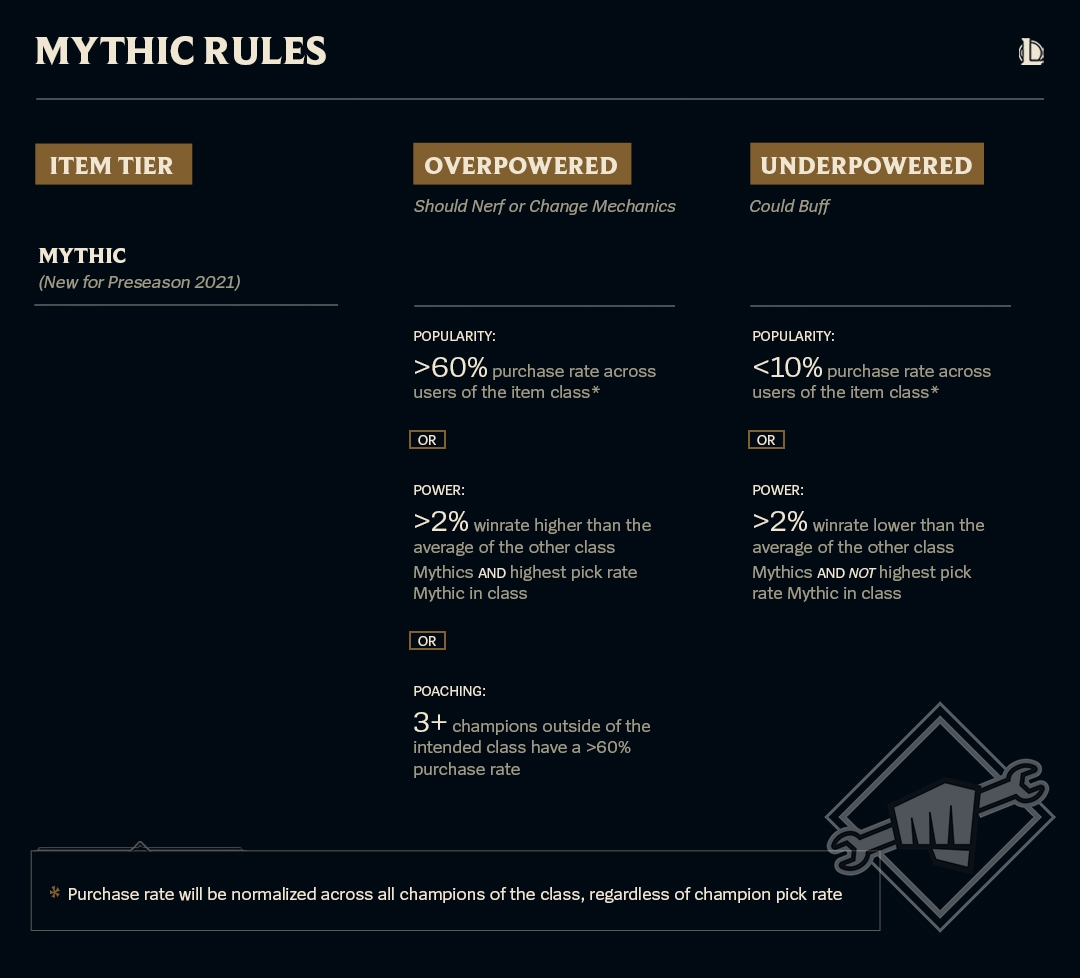
Let’s start with the OP section. We expect that a Mythic Item will be overpowered if it’s…
- Popularity: Purchased too consistently across its class
- Power: Both highly purchased and has a notably higher winrate than other options
- Poaching: Multiple champions outside of its intended class purchase it in most games
Purchase rate is a pretty simple metric that we’ve used to determine an item’s power for a long time. If an item becomes a must-buy for a lot of champions, it's probably just too strong.
Moving onto the second metric, winrate has long been an unreliable stat for judging an item’s power because purchase timings and champion selection so heavily biased these numbers. However, Mythics specifically are competing for the same exclusive slot (the first-purchase slot) and will be similarly priced, which makes winrate a more valid metric. That said, we’re allowing for a higher winrate if the pick rate is low because it might indicate an item is in fact balanced, but only purchased in situations it would excel in (the Mejai's conversation from the intro).
The final overpowered criteria for Mythics is whether they’re poached too often, with multiple champions outside of the class buying them a majority of the time. While flexibility is a goal of this system, having numerous champions reach across classes (and therefore likely paying a stat cost) to purchase a specific Mythic indicates that it's just too strong.
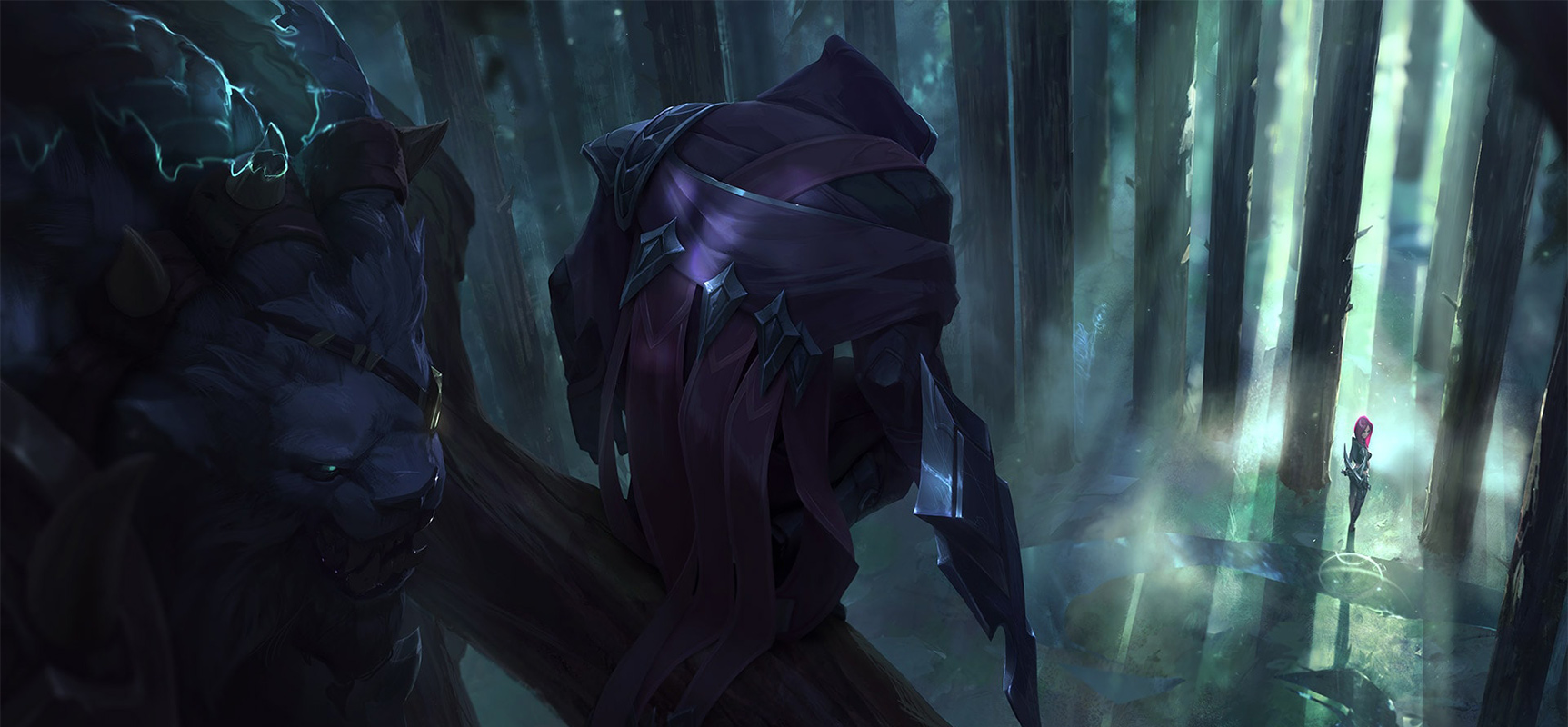
Now let’s talk about how we’ll assess if Mythics are underpowered. A Mythic is considered weak if…
- Popularity: It’s not purchased enough compared to its competitors across the class
- Power: It has a lower winrate than other Mythics on average AND is not the most popular one in class
The first metric is pretty intuitive—we want you to be able to make strategic choices about which Mythic to buy based on the game you’re in, and if a Mythic is being purchased too little, it’s probably too weak.
The second metric reflects items that are weak but not critically unpopular. While popularity is a decent indicator the item is strong in a number of situations, an item that is weaker than the average Mythic (as measured by winrate) and is not the most popular indicates that the power level is too low. Buffing it in this case will likely create more choice and a better experience for the class using the Mythic item.
Within this bucket, there will also be cases that signify that the item is falling short of the fantasy, but we will first make sure it’s not just being ignored due to low power levels. Read: We'll try buffing a Mythic item before we rework it (initial preseason launch window aside, if there are cases where things are obviously off).
MYTHIC HARDBINDING
Our initial approach to Mythics is to ensure they’re in a relatively balanced state. But it’s possible that even when balanced, Mythic items bind too hard to specific champions or groups—meaning those champs or groups generally only purchase that one Mythic regardless of context. This is where we walk the fine line of pushing towards a champion’s fantasy, but not making an item so looped into their pattern that they can never deviate.
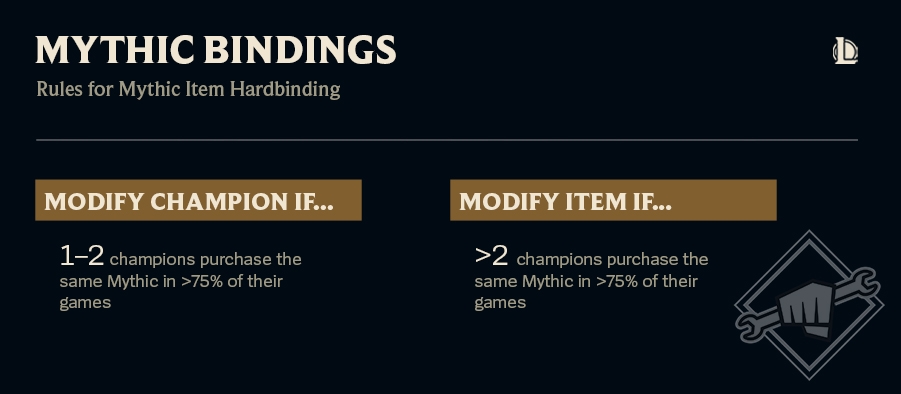
We expect that if an item is binding to 3 or more champions, then it’s likely the item itself could use some work to unbind it. (If that item is also triggering OP thresholds, we'll try nerfing it first to see if that solves the issue.) If only one or two champions are hardbound, then the champions themselves may need small modifications to make the stats or patterns of Mythics less critically tied to their needs.
LEGENDARY RULES
Let’s move onto Legendary items, which are all of the other fully completed items that aren’t Mythics (Rabadon’s, Sterak’s, etc.).
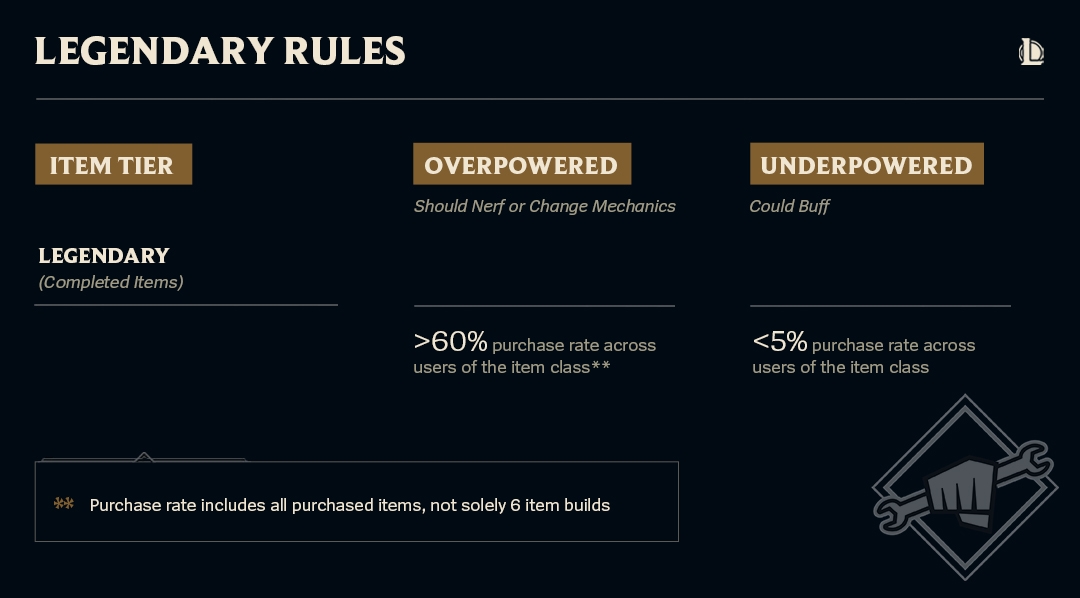
Because winrate is an unreliable stat for items that don’t have a defined purchase slot (e.g. bought first all the time), we’ll only be looking at Legendary items’ purchase rates. The premise for the parameters here is simple: We don’t want items to be purchased too much or too little.
If one item is dominating the choices across a class, it implies it has too little context, is limiting decision making, and is probably just too strong. Likewise, we don’t want items that have trivial usage rates. If it’s too weak, we should obviously buff it. And if an item is balanced but too niche, then it should probably not clutter the shop and complicate other decisions.
CHAMPION-SPECIFIC RULES
Most of our balance focus is around classes, as we think keeping the ecosystem broadly healthy is the most consistent path forward. But we also want to ensure that individual champions have good strategic choices and many items that tickle their fancy.
To that end, we’ll be holding individual champions and their associated item systems to the following rules:
- No champion should buy the same Mythic > 75% of the time: We covered this one in the hardbinding section earlier.
- No champion should have a single Mythic with a > 6% winrate higher than all their other options: One item with such a clear power disparity will likely ruin choice, even if it is not immediately violating other rules.
Breaking the above rules will indicate to us that a champion doesn’t have sufficient choice in their Mythic selection, which means we’ll need a design solution to broaden the champion’s item choices.
We also have a rule for Legendaries:
- Each champion should have 10+ Legendaries with >3% purchase rate: While a lot of the fanfare will be paid to the new Mythic class of items, we want improved number and quality of choices across the entire build. This criteria reflects an aspirational goal that will push us towards making more Legendaries viable.
What Comes Next?
We're extremely excited (and hard at work!) to get these items and choices into your hands this preseason. We’re planning to do a longer-than-usual PBE run because we expect there to be a lot of follow-up work, and we want things to be polished and tuned in time for the start of the season.
Our new Item Balance Framework will help us to get to—and maintain—a fair and balanced system that allows for meaningful choices and excitement over the coming seasons. And as always, we’ll keep working to improve our game systems and your experiences with them!
Here’s the complete Item Balance Framework, just in case you want to share it on a salty forum on our behalf :’)
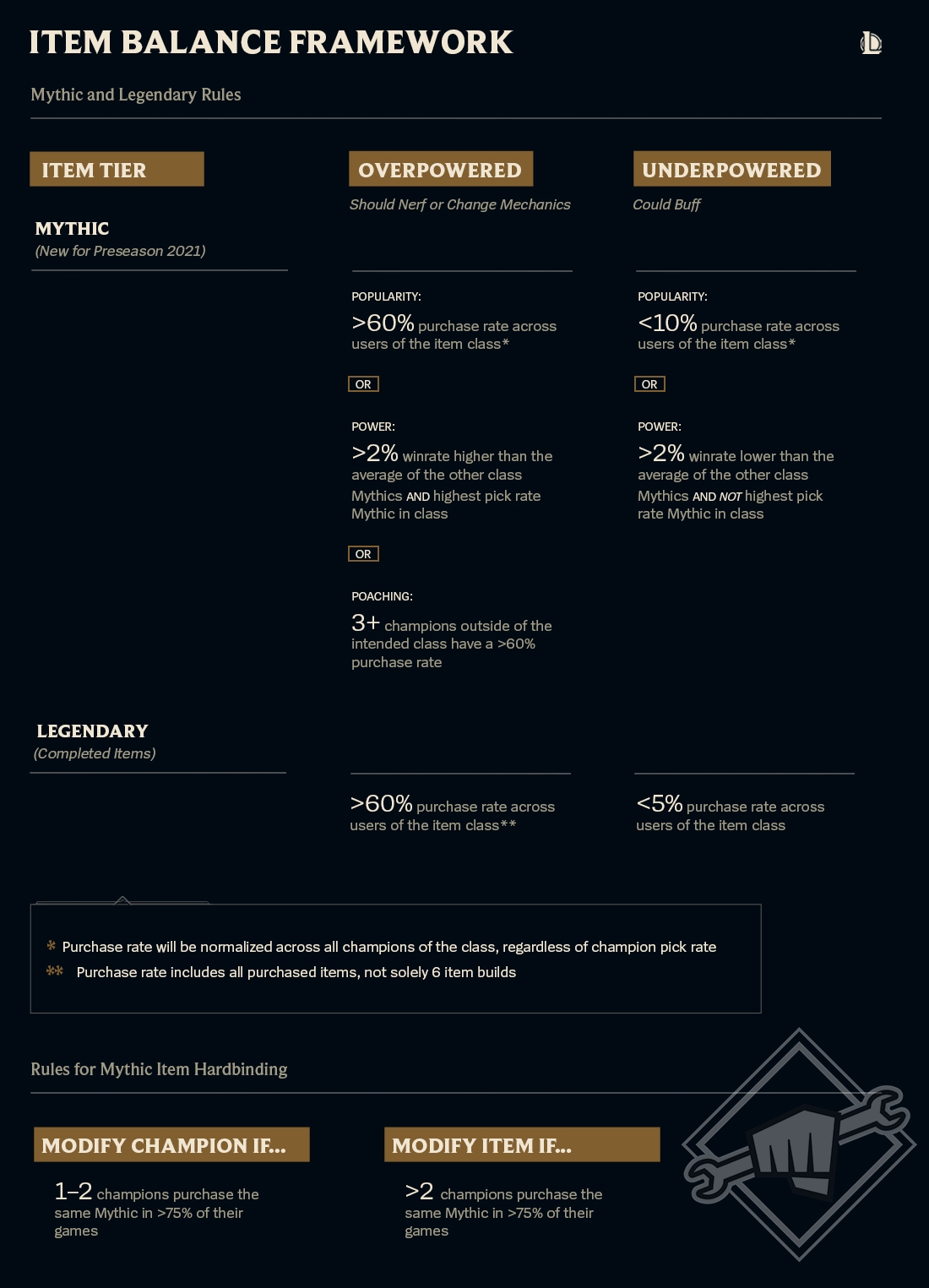
For those who have been reading this textbook of a series (or just dropped by!), thank you for coming along for the ride. We’re eager to continue sharing our processes and thoughts in the spirit of transparency and with the hope that it will lead to improved balance for League. We’re curious which topics you’re interested in hearing more about, so please let us know.
You can expect to hear more from the Summoner’s Rift Team soon, including a list of preseason’s biggest item changes in the next few weeks.
